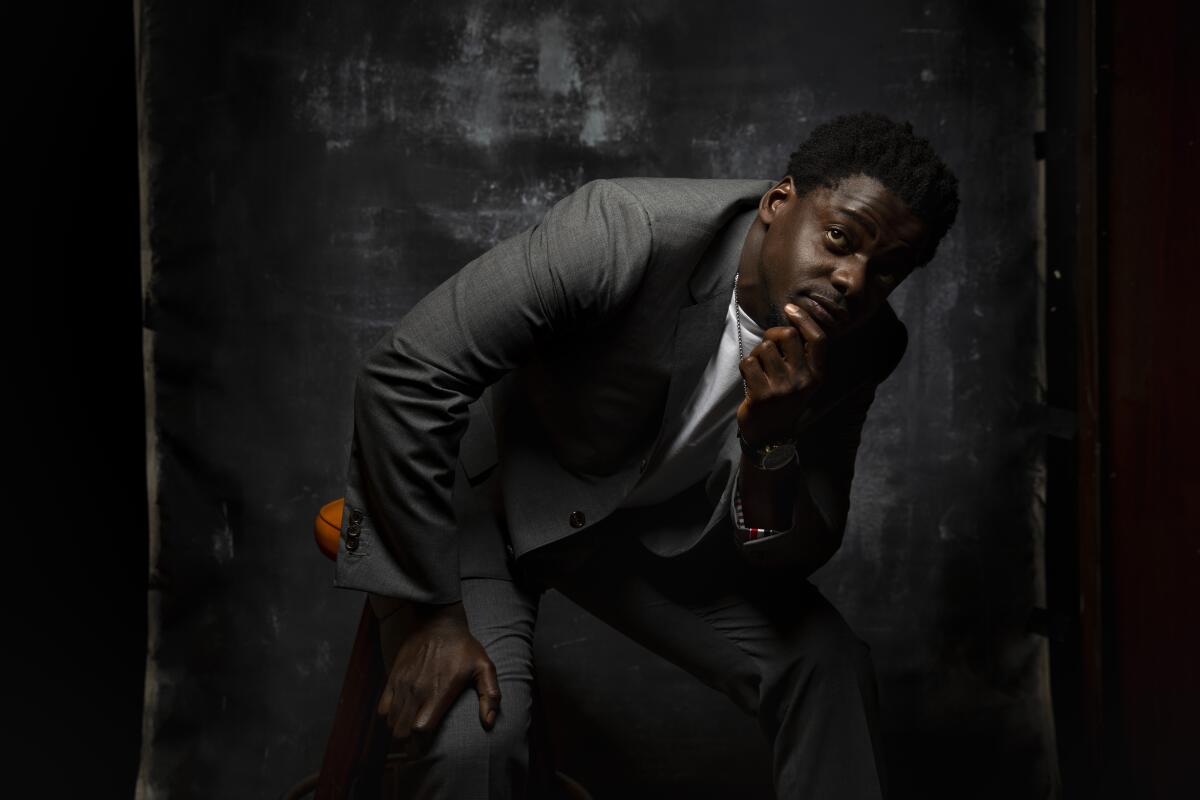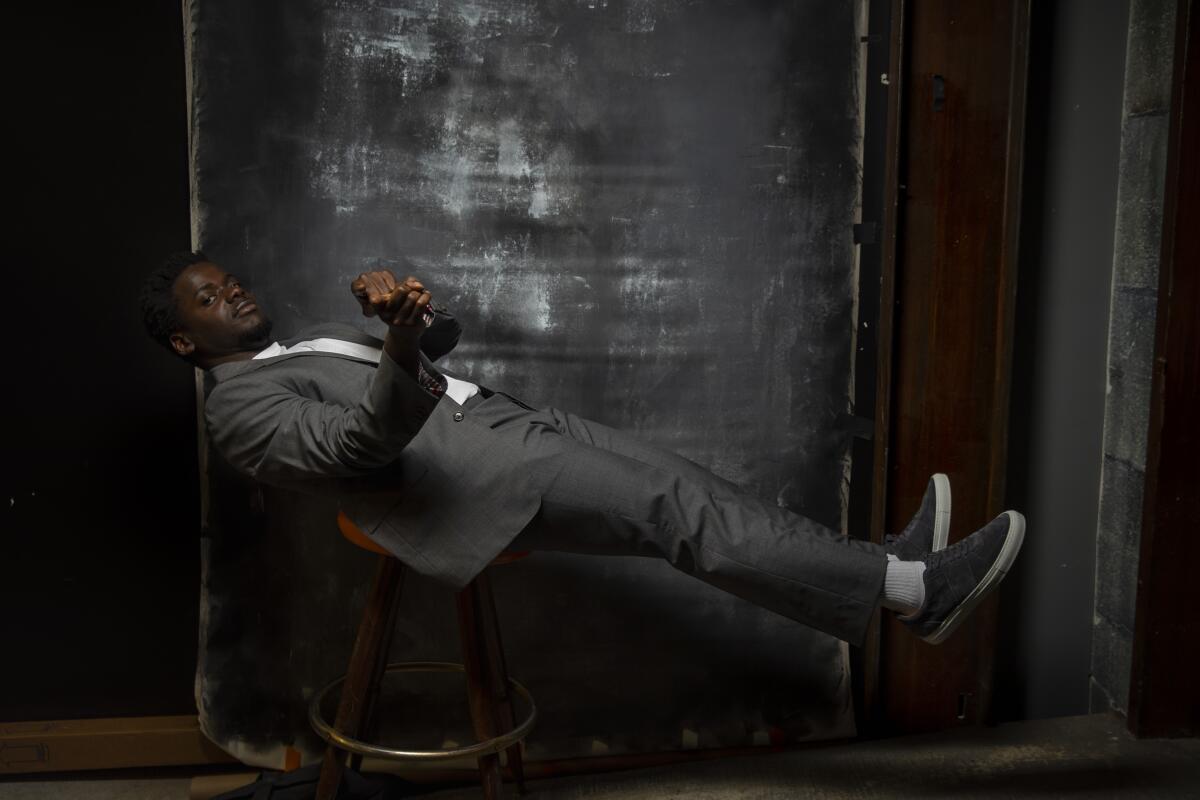Why Daniel Kaluuya fought for ‘Queen & Slim’: ‘I like things that are misbehaved’

- Share via
Daniel Kaluuya is used to getting people talking.
After appearing in the first season of Charlie Brooker’s dystopian anthology series “Black Mirror,” the British actor went on to deliver a breakout performance in Jordan Peele’s genre-redefining psychological horror film “Get Out,” for which he was nominated for an Oscar.
In the two years since, he’s had memorable turns in Marvel’s megahit “Black Panther” and Steve McQueen’s critically acclaimed “Widows” before once again taking the lead in the Thanksgiving release “Queen & Slim,” directed by Melina Matsoukas from a script by Lena Waithe.
“It’s a blessing, man,” he said over a late October lunch at Mid-City’s Paper or Plastik cafe. “I realized I’m always there at the beginning of things: Doing Jordan’s first [directed] film and then Lena’s first film, the first [season] of ‘Black Mirror,’ ‘Black Panther.’ It’s a nice thing to affirm something that could be in the zeitgeist.”
In the same way that “Get Out” and “Black Panther” sparked broad and unexpected cultural conversations when they were released, “Queen & Slim” is primed to do the same. A love story about an unlikely black couple on the run after an altercation with a police officer, the film was intended as a meditation on police brutality and feels decidedly of the times.
“I like grounded, big stories. I like accessible excellence. I want to make films for people that watch two films a year. I’ll either be in one of the two or you have to sneak me in that third one, bro.”
— Daniel Kaluuya
“I like things that are misbehaved,” said Kaluuya of his attraction to the script. “I like grounded, big stories. I like accessible excellence. I want to make films for people that watch two films a year. I’ll either be in one of the two or you have to sneak me in that third one, bro. You’ve got to take that girl out for the third one! Because they’re honest. There’s an array of reasons why I do ... but I try and inform my gut so then when my gut reacts, I trust the gut.”
That gut instinct has led the 30-year-old London native to work almost exclusively with some of the most acclaimed black directors of our time, including Peele, Steve McQueen and Ryan Coogler, though Kaluuya says that was never intentional. It’s merely a byproduct of avoiding roles that aren’t fully formed human beings.
“I made a decision back in the day with my agent,” he said. “A role would come in, it was usually a black guy: ‘He’s really nice, he’s part of the gang. Three quarters into the [movie] he gets killed and then the white male [protagonist] is like, ‘You can’t kill the good black guy. I’m a good white guy!’ And I call that role a lamp. Because in a bedroom, you need a lamp. It adds something. It doesn’t feel like a bedroom [without it] but it’s not the focus of the bedroom. So a lot of times these roles are lamp roles.
“I hate to say the term ‘woke’ but I got up and I was like, ‘Wait, hold on, a lot of filmmakers are using blackness in order to add credibility to the scenario,’” he added. “They’re not interrogating the [black characters] as human beings and three-dimensional people because they just don’t know them and that’s fine. But I just got tired of doing that. And when I identified it and articulated it and decided not to do that, I started working with more [black directors].”
As for “Queen & Slim” — which marks the feature directing debut of Matsoukas, known for her work in music videos (including Beyoncé’s “Formation”) and TV (“Insecure,” “Master of None”) — Kaluuya says he gravitated to the role of Slim because he “felt it.”
“[I] felt for him, felt for their predicament,” he said. “Everyone thought I was crazy because ‘Get Out’ came out and [afterward] I was like, ‘I want to do a rom-com.’ I was telling everyone I wanted to do a rom-com. And then [‘Queen & Slim’] came in and I was like, ‘Yeah, man.’”
While the project does involve both romance and comedy, it also has a deadly serious edge. Slim is something of an Everyman character, who meets the pricklier professional Queen (newcomer Jodie Turner-Smith) via Tinder. It’s on their very first date that things go sideways and the two are forced to rely on each other to evade the law. The timeliness of the story, paired with the layered depth of the two characters, stirred Kaluuya enough to petition Waithe for the role.
“The element of fighting for your life and the trouble that gets you in really resonated with me,” he said. “That journey, I felt, was really honest. And there were a lot of story turns that were really considered. It was really thoughtful and it wasn’t preachy, it was complex. I would watch it. Sometimes I just want to be in stuff I’d watch. And some stuff I’d watch I go, ‘I shouldn’t be in that’ because I just don’t think I’m right. I trust that instinct in myself. So this one I said, ‘I think I should be in this.’ And I put my hat in the ring.”
The actor says working with Waithe and Matsoukas — a rare example of two women of color collaborating on a major studio film — was “inspiring.”
“They’re a force,” he said. “I was fans of them in isolation. I came across a Lena script, the original pilot of [Showtime series] ‘The Chi,’ and I’m like, ‘Who the ... is this? This writing is amazing.’ And then Melina, I was a fan of the Solange video and the ‘On the Run’ trailer she did [for Beyoncé and Jay-Z], and then ‘Insecure.’ I love ‘Insecure.’ I don’t watch a lot of ... but I watch ‘Insecure.’ So it was one of those blessings where you’re working with people you respect.”

Kaluuya, who had primarily worked on British productions until a supporting role in the 2015 thriller “Sicario,” says the main difference between acting in the U.S. and England is the larger presence of “politics” in Hollywood.
“There’s more money on the line, and more press,” he said. “My career in England didn’t equip me for the amount of press. And it’s a bit more meritocratic [here]. It’s like there is some sense to it. If you make money, you get more stuff and you get paid more. In England, it’s very much, ‘Ah, you’re popping. We need a new one.’”
The workload for American actors is also much greater, he said.
“Americans work very hard. Very hard. I usually [make movies] back to back to back [here]. It’s very tough. Also I’m doing a new accent and trying to make it feel like I’m not doing an accent ... it’s a lot of hours going into that. And it just takes more out of me in comparison to U.K. jobs. There’s a lot more research because I give a [crap].”
For example, to play the working-class Slim, Kaluuya spent time at a Cleveland Costco during Slim’s imagined Sunday shift. Upon learning the going rate for an employee in Slim’s position (approximately $38 an hour), Kaluuya used that to map out the character’s sense of self.
“He’s the man, he gets paid $38 an hour,” he said. “It’s the mentality of, even though the date’s not going well, he still thinks he’s going to get laid. That’s entitlement. Entitlement because he thinks he’s a catch. It’s not overtly aggressive but it’s innate. And trying to, in that first bit, still make him likable.”
Conversely, with roles in the U.K., that level of research is not always as necessary. “If I’m doing stuff in the U.K., when I read I’m like, ‘I know that guy.’ There’s certain roles I play in England where I’m like, ‘I know who he is.’”
But having to do the research has been amazing in terms of personal growth, he says. “It’s fun in the sense where you are challenged and pushed. You’re forced to think differently, forced to take on different perspectives.”

Kaluuya got his start in acting after a recommendation from his fifth-grade teacher.
“My teacher said to my mom, ‘He’s busy. He should do acting,’” he said. “[But] I couldn’t afford [acting classes]. There was a class in my area where for £5 a class you could do improvisation. There was a four-year waiting list so I ended up getting in at 13. It was like an afterschool club.”
Next came stints in local youth theaters. “Anything that was free, I’d do it,” he said. “Because I was doing that, I got my first job,” a play that was performed underneath a church. “I was acting in some random place,” he said with a laugh.
He got his first major role on the popular E4 drama “Skins,” which he also contributed to as a writer at just 18. “I realize I was able to do that because ‘Skins’ was structured in a way where I could [write something] and it would get made,” he said. “I look back at that era in my life and go, ‘You were a confident ... boy.’ I did not have one inch of self-doubt.”
Asked to name his most challenging role to date, Kaluuya picks the play “Sucker Punch,” where he played a lightweight boxer in ’80s London. The role required him to lose 42 pounds in three months. He was 21 at the time.
“I had six monologues where I skip in,” he said. “It was challenging but I was hungry. I was hungry. So that was a huge amount of personal growth on that one.”
Up next, Kaluuya will lend his voice to a “radical retelling” of “A Christmas Carol” alongside Andy Serkis, Carey Mulligan and Martin Freeman before starring in Shaka King’s “Jesus Was My Homeboy,” a biopic centered around Black Panther Party member Fred Hampton. He’s also been announced as a producer on a live-action “Barney” movie, an unexpected sign of his ambitious plans to expand his ventures behind the camera.
“I reckon that’s where I’m headed,” he said. “I realize I’ve got a personality where I don’t really enjoy being by myself that long. So I need to formulate how to do that. But the next phase is definitely being behind the camera and just experimenting in that space and growing that side of me.”
More to Read
Only good movies
Get the Indie Focus newsletter, Mark Olsen's weekly guide to the world of cinema.
You may occasionally receive promotional content from the Los Angeles Times.











